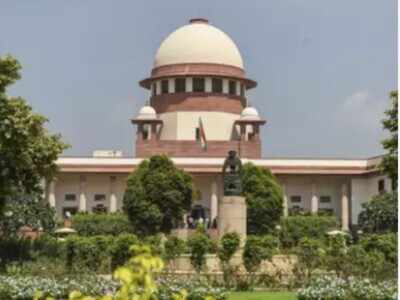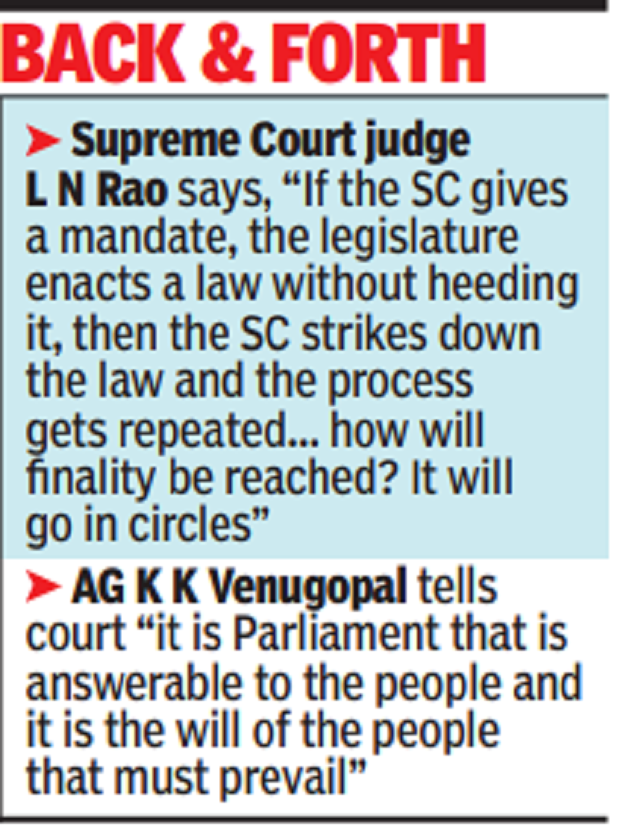Top Searches
- News
- India News
- Supreme Court, government now lock horns over tribunal reforms
Supreme Court, government now lock horns over tribunal reforms

NEW DELHI: A confrontation has been brewing between the Supreme Court and the Centre over the past weeks with the two constitutional entities locking horns, first over Covid-19 vaccination and pricing policies, and then on Thursday over promulgation of the Tribunal Reforms Ordinance, which is allegedly in utter disregard of apex court judgments.
If a bench of Justices D Y Chandrachud, L N Rao and S R Bhat had termed the Centre’s Covid-19 vaccination policy for the 18-44 age group as “prima facie arbitrary and irrational” in an order published on Wednesday, another bench of Justices Rao, Hemant Gupta and Bhat on Thursday said the ordinance was a reflection of the Centre's "recalcitrant and adamant" attitude in attempting to override the mandate given by the SC.

During the hearing on Covid-19 management issues on May 31, solicitor general Tushar Mehta repeatedly and firmly appealed to the SC not to step into the executive's policy domain by seeking to tweak policy frameworks. Mehta had said the judiciary was barred from substituting the executive's wisdom with its own. The SC had conceded that policy-making was within the executive's sole domain but said it would not be a silent spectator when policies breached the constitutional rights of citizens.
On Thursday, the bench of Justices Rao, Gupta and Bhat reserved its order on petitions challenging the constitutional validity of the Tribunal Reforms (Rationalisation and Conditions of Service) Ordinance, 2021, which sought to differ from the SC mandate for a five-year tenure to chairpersons and members of tribunals by prescribing a four-year tenure; also fixing eligibility age at 50, which negated the court order for allowing lawyers with 10 years experience to be in the zone of consideration.
Justice Bhat asked, "Why is a recalcitrant executive going on enacting laws as if the judgments of the Supreme Court do not exist?" Attorney general K K Venugopal said it was Parliament's job to enact laws as it was for the SC to determine their constitutional validity. Justice Rao said, "If the SC gives a mandate, the legislature enacts a law without heeding it, then the SC strikes down the law and the process gets repeated... how will finality be reached? It will go in circles. "
The AG said, “It is not that Parliament does not deliberate before enacting a legislation. There is a whole process to it. Moreover, several times, the views of the standing committee are also taken into account and then it is debated in the House. Moreover, it is Parliament which is answerable to people and it is the will of the people which must prevail. It is the MPs who face criticism, many a times in intemperate language, which the judges do not face.”
Justice Bhat said, “Each wing of governance can interpret the Constitution and no one violates its provisions internationally. But does this argument mean that the interpretation of the Constitution by 500-odd MPs in Parliament is more accurate than that of the SC benches comprising two or three judges? I do not agree. I agree judges should have self-restraint while interpreting the Constitution. But if Parliament is always right because it reflects the will of the people, then the SC would be barred from striking down any law enacted by it. We understand there are obvious lines which the court should not cross.”
The AG said the ordinance did not reflect any major change except reducing the tenure of the chairperson and members to four years, instead of five as mandated by the SC. “How does a tenure of four or five years affect the independence of the judiciary?” he asked.
“Just as the legislature or the executive cannot (intrude) on the jurisdiction and powers of the judiciary, so too it is beyond the competence of the judiciary to trench upon the jurisdiction and powers of the legislature or of the executive. A decision by the executive or by the legislature on what should be the tenure of a chairperson or member of a tribunal, or the age of retirement of members, or the terms and conditions of service, are exclusively within the competence of the legislature and the executive and, by reason of the doctrine of separation of powers, is not open to judicial review unless it violates fundamental rights,” Venugopal said.
To rub it in further, the AG said, “Legislation is purely Parliament’s jurisdiction and so too is the ordinance making power of the executive which is also part of the law-making power. In such a case, it is not competent for the court to mandate that a law shall be passed by the legislature on particular lines and/or in a particular manner as this would violate the doctrine of separation of powers. To compel the legislature or the executive in making an ordinance to make a particular law is, in substance and effect, the exercise of legislative power which is beyond the competence of the courts.”
In what would hurt the SC, the AG said, “Just as the courts decided for themselves that five years (tenure) would be appropriate, it would equally be open to the executive in making an ordinance to hold that four years with the right of re-appointment would be the appropriate rule. In such a case, no question of validating any law would arise as it is in the exclusive domain of the legislature or the executive to decide what should be the tenure of a chairperson or a member of a tribunal.”
If a bench of Justices D Y Chandrachud, L N Rao and S R Bhat had termed the Centre’s Covid-19 vaccination policy for the 18-44 age group as “prima facie arbitrary and irrational” in an order published on Wednesday, another bench of Justices Rao, Hemant Gupta and Bhat on Thursday said the ordinance was a reflection of the Centre's "recalcitrant and adamant" attitude in attempting to override the mandate given by the SC.

During the hearing on Covid-19 management issues on May 31, solicitor general Tushar Mehta repeatedly and firmly appealed to the SC not to step into the executive's policy domain by seeking to tweak policy frameworks. Mehta had said the judiciary was barred from substituting the executive's wisdom with its own. The SC had conceded that policy-making was within the executive's sole domain but said it would not be a silent spectator when policies breached the constitutional rights of citizens.
On Thursday, the bench of Justices Rao, Gupta and Bhat reserved its order on petitions challenging the constitutional validity of the Tribunal Reforms (Rationalisation and Conditions of Service) Ordinance, 2021, which sought to differ from the SC mandate for a five-year tenure to chairpersons and members of tribunals by prescribing a four-year tenure; also fixing eligibility age at 50, which negated the court order for allowing lawyers with 10 years experience to be in the zone of consideration.
Justice Bhat asked, "Why is a recalcitrant executive going on enacting laws as if the judgments of the Supreme Court do not exist?" Attorney general K K Venugopal said it was Parliament's job to enact laws as it was for the SC to determine their constitutional validity. Justice Rao said, "If the SC gives a mandate, the legislature enacts a law without heeding it, then the SC strikes down the law and the process gets repeated... how will finality be reached? It will go in circles. "
The AG said, “It is not that Parliament does not deliberate before enacting a legislation. There is a whole process to it. Moreover, several times, the views of the standing committee are also taken into account and then it is debated in the House. Moreover, it is Parliament which is answerable to people and it is the will of the people which must prevail. It is the MPs who face criticism, many a times in intemperate language, which the judges do not face.”
Justice Bhat said, “Each wing of governance can interpret the Constitution and no one violates its provisions internationally. But does this argument mean that the interpretation of the Constitution by 500-odd MPs in Parliament is more accurate than that of the SC benches comprising two or three judges? I do not agree. I agree judges should have self-restraint while interpreting the Constitution. But if Parliament is always right because it reflects the will of the people, then the SC would be barred from striking down any law enacted by it. We understand there are obvious lines which the court should not cross.”
The AG said the ordinance did not reflect any major change except reducing the tenure of the chairperson and members to four years, instead of five as mandated by the SC. “How does a tenure of four or five years affect the independence of the judiciary?” he asked.
“Just as the legislature or the executive cannot (intrude) on the jurisdiction and powers of the judiciary, so too it is beyond the competence of the judiciary to trench upon the jurisdiction and powers of the legislature or of the executive. A decision by the executive or by the legislature on what should be the tenure of a chairperson or member of a tribunal, or the age of retirement of members, or the terms and conditions of service, are exclusively within the competence of the legislature and the executive and, by reason of the doctrine of separation of powers, is not open to judicial review unless it violates fundamental rights,” Venugopal said.
To rub it in further, the AG said, “Legislation is purely Parliament’s jurisdiction and so too is the ordinance making power of the executive which is also part of the law-making power. In such a case, it is not competent for the court to mandate that a law shall be passed by the legislature on particular lines and/or in a particular manner as this would violate the doctrine of separation of powers. To compel the legislature or the executive in making an ordinance to make a particular law is, in substance and effect, the exercise of legislative power which is beyond the competence of the courts.”
In what would hurt the SC, the AG said, “Just as the courts decided for themselves that five years (tenure) would be appropriate, it would equally be open to the executive in making an ordinance to hold that four years with the right of re-appointment would be the appropriate rule. In such a case, no question of validating any law would arise as it is in the exclusive domain of the legislature or the executive to decide what should be the tenure of a chairperson or a member of a tribunal.”
FacebookTwitterLinkedinEMail
Start a Conversation
end of article
Quick Links
Coronavirus in MumbaiFarm bill 2020Farmers protestCoronavirus in DelhiCoronavirus in BangaloreCoronavirus symptomsCoronavirus in IndiaWest Bengal elections 2021Coronavirus NewsSolar EclipseNPRWhat is NRCCAB BillCAB and NRCAssam election 2021Podcast newsLok SabhaTamil Nadu Election 2021CongressBJP newsKerala Elections 2021Indian ArmyISRO newsSupreme Court
